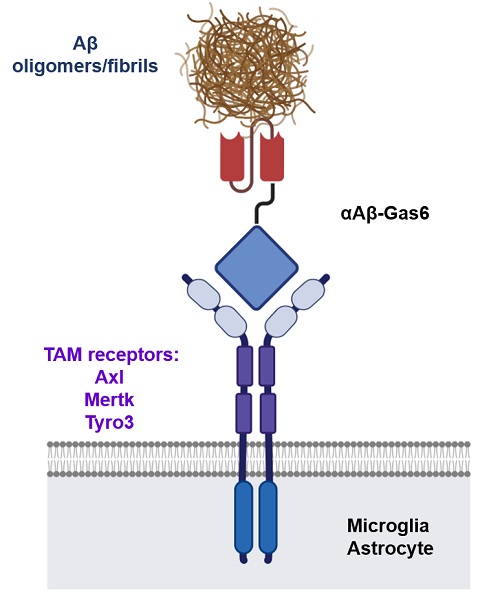A co-research group under Professor Chan Hyuk Kim and Professor Won-Suk Chung from the Department of Biological Sciences announced on August 22 that they have developed a new type of protein-based treatment for Alzheimer’s disease. The study, in which Dr. Hyuncheol Jung and PhD student Se Young Lee participated as co-authors, was published in Nature Medicine under the title “Anti-inflammatory clearance of amyloid β by a chimeric gas6 fusion protein”.

Alzheimer’s disease is the main cause of senile dementia followed by memory loss and cognitive impairment. It is a widely accepted view in academia that Alzheimer’s disease occurs when amyloid β peptides aggregate in the brain and damage synapses and cells. Although there have been some advances in its treatment such as Aduhelm, an antibody-based cure targeting amyloid β, more research is needed to prevent brain inflammation arising from brain edema and brain microvascular bleeding, the side-effects experienced by some patients who took the drug.
The research team solved this problem by manipulating a “phagocytosis inducer for Aβ” that consists of an Aβ-targeting monoclonal antibody fused with a truncated receptor binding domain of growth arrest-specific 6” (Gas6). Gas6 is involved in waste clearance in the brain by selectively removing amyloid β while inhibiting inflammatory reactions. A mouse model revealed that the fusion protein reduces the concentration of amyloid β accumulated in the brain by activating microglia cells and astrocytes. It was also confirmed that memory recollection and cognitive ability of the mouse model remarkably improved when using Gas6 compared to the antibody treatments. This protein design seems to have a distinct advantage over the previous treatments, as the Gas6 fusion protein can dramatically suppress excessive synaptic removal by microglial cells which leads to reduced cognitive function.
The research team stated that the reason many antibody-based treatments have not been so successful was that amyloid β accumulation in brain tissues prevents blood vessels from being cleaned in the right way. They then noted, “Gas6 fusion protein cleans amyloid β without an inflammatory reaction. It reduces the side effects and hence high cognitive ability can be expected to be improved.” The fusion protein developed by the research team is an unprecedented way to treat Alzheimer’s disease and prevent the inflammatory side effects of previously administered drugs. Taking advantage of its new technique, the research team looks forward to applying this new fusion protein to various degenerative brain diseases and autoimmune diseases.

